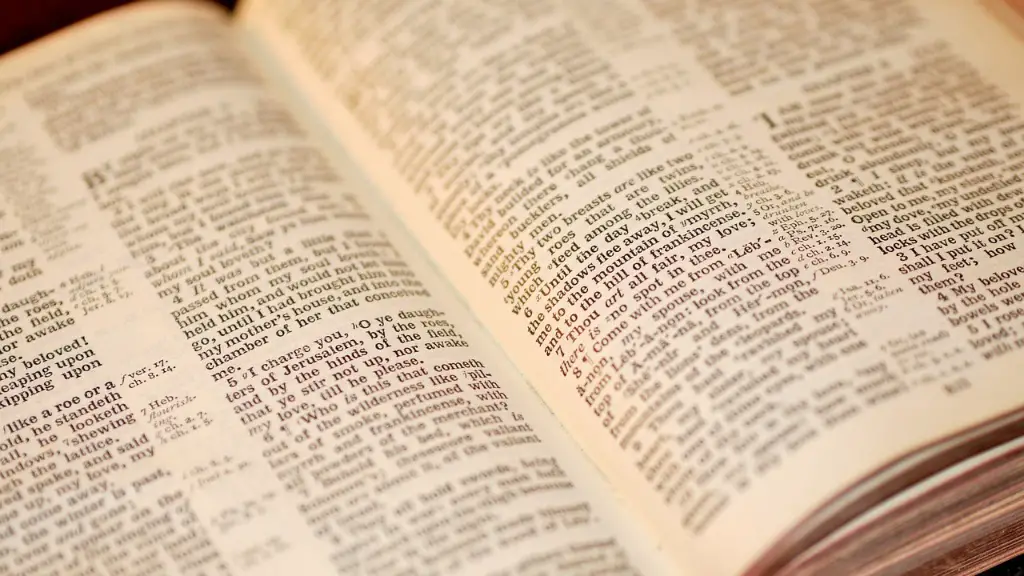Who was King Herod in the Bible? Herod was one of the most prominent rulers of Judea in the first century BCE who, albeit his cruelty and strong control, is discussed in the New Testament.
Herod was born in Idumea, then part of the Roman Empire, in 73 BCE. His father was Antipater I, a man of Edomite descent who had been appointed as a Roman military governor in Judea by Julius Caesar. He was brought up in Jerusalem, and at the age of 25 was appointed by the Romans as a governor of Galilee.
Herod was a cunning and powerful leader. He built strong fortifications around both Jerusalem and his personal palace in Jericho, as well as improving the infrastructure in the region and expanding the port of Caesarea. Herod’s focus on stability and efficiency earned him the support of much of the population as well as the Roman authorities.
Herod’s rule was not without controversy, however. Herod was a very cruel ruler and allegedly had his own sons executed to remove any possible opposition to his rule. He also had a habit of killing perceived enemies and was known to have a deep hatred of the Jews. The Roman historian Josephus records several accounts of Herod’s cruelty and his disregard for justice.
The Bible contains several mentions of Herod, most famously in the New Testament when he ordered the killing of all the children in Bethlehem under the age of two following the birth of Jesus. Herod is considered by the Roman Catholic Church to be a symbol of evil, and his legacy is one of bloodshed and tyranny.
Today, Herod is mostly remembered as a ruthless ruler and hated oppressor of the Jewish people. He is an indelible figure in Jewish and Christian histories, and serves as an example of the dangers of unchecked power and tyranny.
Herod’s Relationship With Rome
Herod’s reign was heavily influenced by his relationship with the Roman Empire. Despite his unpopularity within Judea, he was able to maintain a good relationship with the Romans and many of his projects, such as the construction of the port of Caesarea and the expansion of fortifications around Jerusalem, were either directly supported or allowed by the Romans.
This was, in part, due to the fact that Herod was not Jewish, and as such he was seen as a more reliable leader than any of his Jewish predecessors. The relationships between Herod and the Roman authorities were further strengthened by his marriage to the daughter of Armenian King Tigranes IA in 36 BCE. With these connections, Herod was able to use the power of Rome to further prop up his own rule.
But Herod was also known to have broken promises to the Romans, such as his refusal to pay taxes, as well as his own wavering loyalty to the empire. Fortunately, his relationship with the Romans remained strong throughout his reign and enabled him to continue his rule.
In the modern day, Herod’s relationship with the Roman Empire serves as a reminder of the importance of maintaining good relationships with countries outside of one’s own, and the need for leaders to remain loyal to those who support them.
The Controversy Around Herod
Herod’s ruthless rule has been a source of controversy for two millennia, and his legacy is still debated today. On one side, Herod is seen as a hero who was able to restore some stability and prosperity to a region that was in chaos. He is noted for his public works projects, such as creating water channels, refurbishing temples, and building fortifications.
On the other hand, Herod was known for his violent and ruthless tactics which were used to keep power. He was known for his public displays of humiliation and brutality against his enemies, and was hated by the Jewish population of Judea. While Herod managed to restore some stability to the region, it was at the cost of much violence and bloodshed.
The debate over Herod’s legacy will continue as conversations on morality and power persist. Did Herod’s reign ultimately bring benefit or harm to the region? Were his actions cruel but necessary or merely cruel? Each side of the debate has its merits, and the ultimate answer likely lies somewhere in the middle.
The Political Legacy of Herod
Herod’s reign in Judea had far-reaching implications for the region, both in the short and long term. On the one hand, Herod’s focus on infrastructure and stability ushered in a period of unprecedented economic growth and prosperity. But on the other hand, the population had grown increasingly resentful of his tyrannical rule and the brutality of his methods. This resentment eventually boiled over and started a revolution, eventually leading to the fall of the Roman Empire in 70 CE.
This revolution is seen as a pivotal moment in the region’s history, as the people of Judea were able to throw off the heavy yoke of oppression. It is also seen as a sign of hope that even the strongest of rulers can eventually be forced out of power due to the will of the people and will of God.
The story of Herod and the Judean people serves as a reminder that tyranny can never last and that ultimately, justice will prevail, no matter how powerful the oppressive ruler.
The Significance Of Herod in Christianity
Herod’s legacy is intertwined with Christianity, as it was his order to kill all of the children in Bethlehem under the age of two that is believed to have led to Jesus being taken to Egypt to escape. This incident is mentioned in the Gospel of Matthew, where it is stated that an angel warned Joseph to flee with Jesus to save him from Herod’s wrath.
To Christians, Herod is a figure of evil and is seen as a symbol of the importance of faith and perseverance in the face of adversity. The New Testament often speaks of Jesus being challenged by Herod and his men, but ultimately triumphing over their threats with love and compassion instead of hatred and violence.
Herod is therefore seen as a powerful reminder of the power of faith, the importance of standing against evil, and the strength of love over hatred.
Herod in Jewish Thought
Herod’s legacy is also felt in Jewish thought, where he is seen as a symbol of the oppressive Roman rule in Judea. He is remembered for his cruelty and his violations of Jewish law, and many Jews still consider him to be an evil figure.
But Herod is also remembered in a positive light by some, who note his focus on public works projects, his restored stability to the region, and the fact that he was not Jewish and so was seen as a more reliable ruler than any of his Jewish predecessors.
Regardless of which side of the debate a person may fall on, Herod’s legacy will be remembered for centuries to come. He is a symbol of the dangers of unchecked power and unbridled tyranny, and a reminder of the importance of faith, perseverance, and love in the face of adversity.





